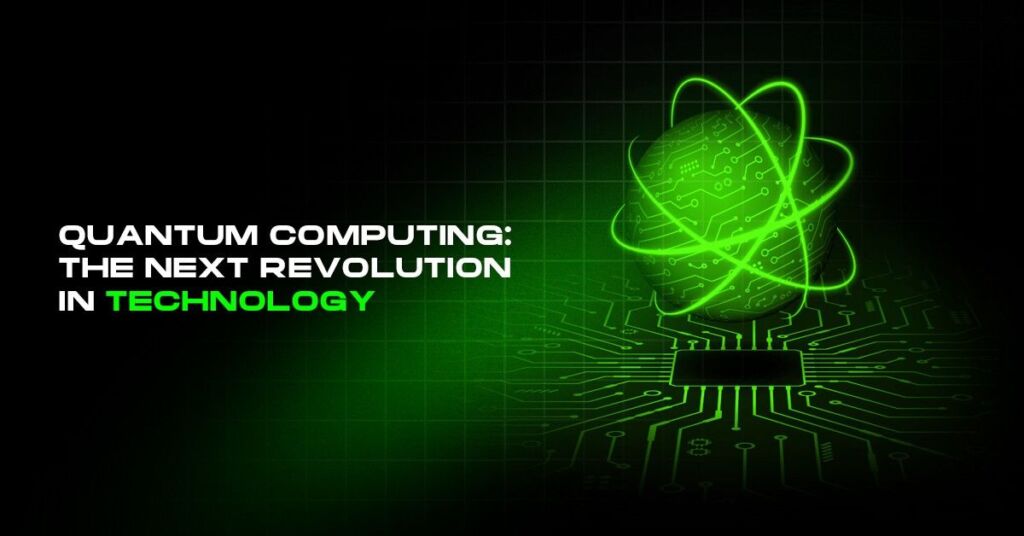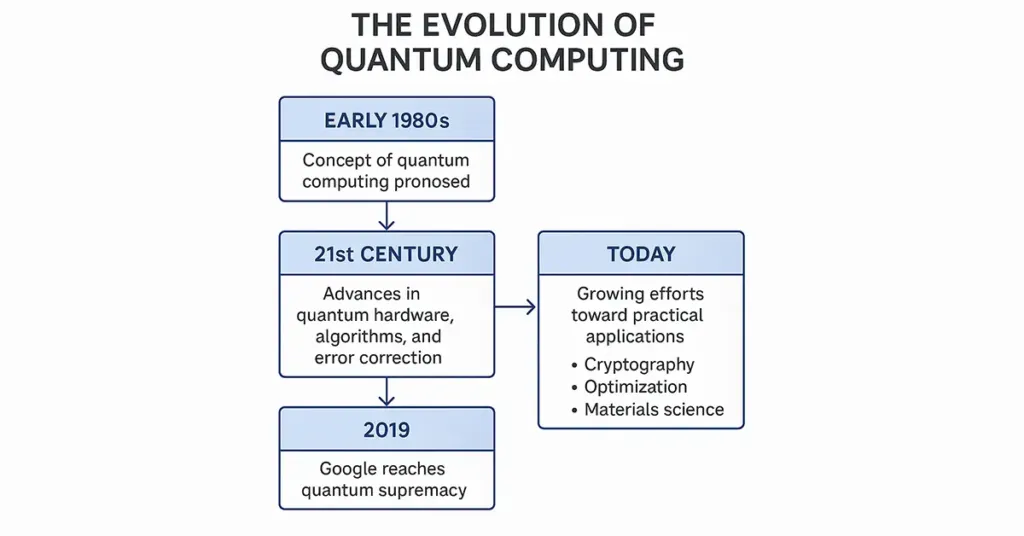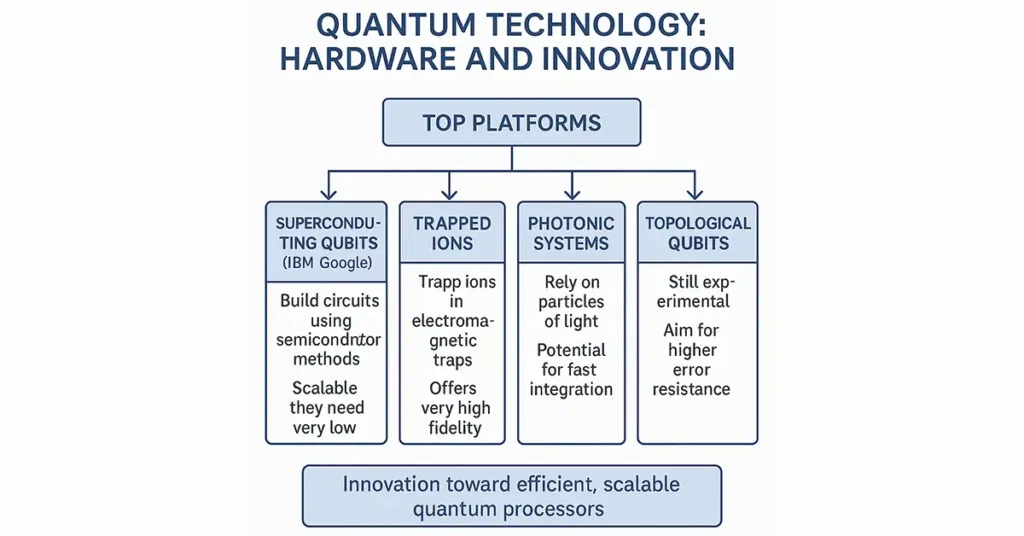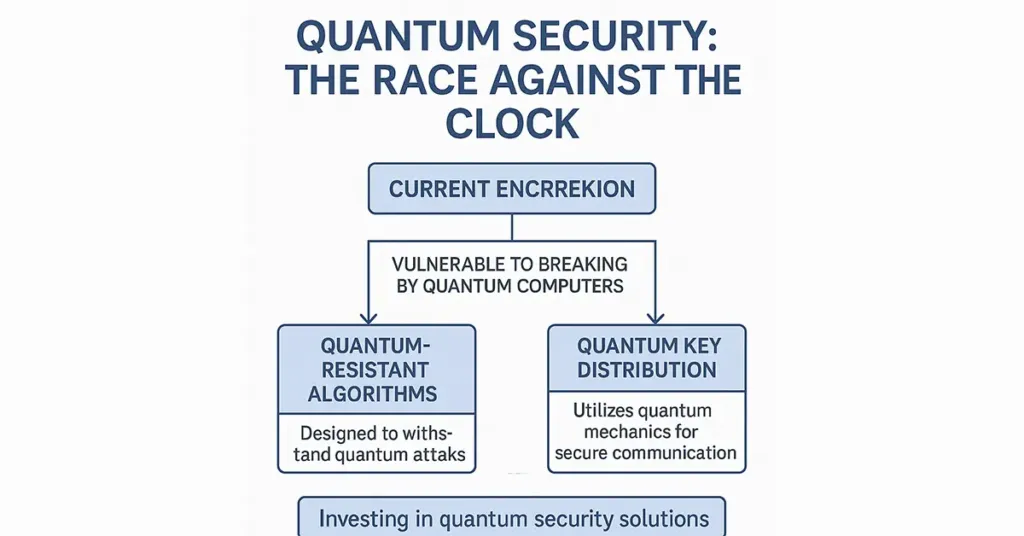Table of Contents

What if the computer of the future could help alleviate some of the problems facing us today in seconds? It would take a traditional computer millions of years. That is what quantum computing promises to deliver: a revolution that can revolutionize all the sectors it comes into contact with. From science and medicine to finance and cybersecurity, quantum computing is spearheading the next technology revolution.
This article explores the fundamentals, current progress, and real-world applications of this innovation. We’ll uncover how it’s changing the rules of computation and setting the stage for a faster, smarter, and more efficient future.
Understanding Quantum Computing
Scientists have rebranded how computers calculate information by producing qubits, unbound by the binary constraints of traditional bits. Unlike traditional bits, which are 0 or 1, qubits can appear everywhere in a quantum superposition due to superposition and entanglement. This allows machines to solve several calculations at once, not one after the other, significantly heightening their ability to solve certain problems.
By superposition, the engineers enable a qubit to hold more than one state. By entanglement, they connect qubits in a way that a manipulation of one immediately affects the rest no matter where they are physically located. These operations permit quantum computing-based systems to be superior to classical systems in cryptography, molecular modeling, and optimization of data. As researchers improve the stability of qubits and system precision, they are bringing us closer to a solution deemed intractable.
The Evolution of Quantum Computing

Back in the early 1980s, physicists such as Richard Feynman talked about using quantum mechanics for computing. It took scientists several decades to work on the idea, but the technology was not ready yet to make it a reality. During the 21st century, scientists and engineers started surmounting such challenges by improving quantum hardware, sophisticated algorithms, and superior error correction methods.
In the past two years, companies such as IBM, Google, Intel, Rigetti and IonQ have invested a lot in creating reliable and large quantum machines. In 2019, Google achieved quantum supremacy when its machine solved an exact problem in just three minutes, while the fastest standard computer would have taken many days to do this.
Today, this rivalry continues intensifying with groups pushing the limits of innovation. What they do lays the foundation for a future when quantum computing upends areas such as cryptography, optimization, and materials science.
Quantum Computers in Practice
Quantum computers are starting to surpass themselves in real, applied applications in numerous sectors. In medicine, they are utilized by researchers to model and simulate intricate molecular interactions, which accelerate the discovery of new drugs and decrease costs of development. Crunching computations, slowing down traditional machines, quantum computers enable scientists to simulate compounds virtually before proceeding to actual experiments.
Logistics engineers use quantum-inspired techniques to tackle routing optimization, inventory optimization, and supply chain optimization. These systems are efficient at solving complex combinatorial problems at unparalleled speeds, enabling firms to save time and money.
Quantum algorithms are employed by financial companies to better model risk scenarios and identify fraud more appropriately. These innovations assist decision-making and possess a greater security feature.
Data scientists also incorporate quantum systems in machine learning pipelines, which reduces the time to train large models. Meteorologists look forward to more accurate weather predictions by more accurately modeling atmospheric systems. Cryptography and materials science advances also continue.
With quantum computing continuing to advance at a tremendous pace, its application is beginning to leave theory behind and head towards transformational uses. With more organizations turning to technology, quantum computers will help solve some of the globe’s most complicated and most critical challenges.
Quantum Algorithms: Solving the Unsolvable
Quantum algorithms propel the transformative potential of computation to be. Computer scientists and mathematicians created the algorithms to bypass challenges that in essence are insurmountable for traditional systems. Shor’s algorithm, for instance, breaks large numbers exponentially more quickly than any standard process—a development that threatens modern-day encryption standards. Security professionals everywhere now reassess cryptography systems in preparation for such disruptive capacity.
Grover’s algorithm optimizes searching by greatly decreasing the amount of time needed to find a particular item within unordered databases. Rather than going through each entry individually, Grover’s algorithm enables users to learn outcomes with considerably fewer steps, providing a quadratic speedup.
In contrast to conventional algorithms that simulate existing computing paradigms, quantum algorithms rework problem-solving solutions altogether. They function on new foundations of principles, using entanglement and superposition to produce outcomes that are outside classical bounds. Designers must now work on creating new logic and architecture that leverages this style of computing.
Instead of just extending the capacity to compute, quantum computing provides us with a fresh manner of computing. It can potentially enable us to solve optimization problems, simulate physical systems, and crack cryptography that are currently intractable, thus ushering in a new era of computational science.
Quantum Technology: Hardware and Innovation

Scientists and engineers continue to innovate cutting-edge hardware that enables quantum technology to become a reality. This is about the physical devices and systems that enable quantum computers to function. Currently, various top platforms compete to develop the most efficient and scalable quantum processor. Superconducting qubits, trapped ions, photonic systems, and topological qubits each with its own strengths best suited for various approaches.
Superconducting qubits, exploited by IBM and Google, enable scientists to build circuits with well-established semiconductor fabrication methods. Scalable, they need very low temperatures to function. Trapped ion systems attain very high precision and coherence by trapping ions in electromagnetic traps and controlling them. Less scalable currently, they offer very high fidelity for quantum operations.
Scientists also examine photonic qubits, which rely on particles of light to carry and process quantum information. They are potentially faster and less complicated to integrate with communication networks. Meanwhile, topological qubits, still very experimental, target higher error resistance through inherently robust quantum states.
On all platforms, innovation is aimed at longer qubit coherence times, reduced error rates, and developing stable quantum systems interconnects. All these advancements all contribute to the foundations for developing scalable, distributed systems that realize the full potential of quantum computing.
Quantum Blockchain: A New Era of Decentralization
Researchers and programmers are introducing a new age of decentralization with the integration of quantum principles into blockchain technology. With the rising threat of quantum leaps jeopardizing the traditional cryptography techniques such as RSA and ECC, the world of blockchain has already started implementing quantum-resistant cryptography for developing future-proof security. These new cryptography protocols are created to safeguard digital transactions from decryption attacks by future technologies.
Within this emerging context, quantum blockchain is a potentially revolutionary invention. It distills the potential of decentralized networks’ benefit and pairs it with the security of quantum mechanics. Programmers may use quantum entanglement to develop tamper-evident consensus algorithms that synchronize ledgers between nodes at previously unthinkable speeds and precision. Not only does this optimize validation schemes but lessens the resources and time to reach an agreement in a distributed network.
Besides that, scientists are developing quantum channels to enable instant and secure communication between nodes. These latest technologies can help get rid of some of the practical problems experienced by traditional blockchains such as latency and being unable to handle much information. Therefore, companies involved in securing important transactions are carefully studying this new technology.
With further progress, quantum computing is poised to influence the evolution of blockchain systems that are decentralized and, more importantly, naturally secure for the post-quantum world.
Quantum Security: The Race Against the Clock

As researchers and engineers continue to advance the field of quantum computing, they also extend the need for robust digital protection. Methods of encryption currently employed, such as RSA and elliptic curve cryptography, are based on the hardness of solving problems like prime factorization and discrete logarithms. Regular computers would have a hard time finding solutions for such problems, but quantum computers could potentially achieve it within hours, undermining everything from secure communications to highly classified government documents.
In turn, computer security professionals are working flat out to come up with new protections. They are designing quantum-resistant algorithms that will resist attacks by quantum computers. Quantum key distribution (QKD) is one of the most effective weapons, and it employs the principles of quantum mechanics to create safe channels of data. If an eavesdropper attempts to intercept the key, the system will know about the attempt and close down the contaminated information.
Governments, organizations, and research organizations are investing in post-quantum cryptography to remain one step ahead of the impending threat. The hackers, however, are encrypting information now to break it when quantum power is developed—a technique known as “harvest now, decrypt later.”
The cybersecurity world globally is being rapidly revolutionized. Organisations have to evolve all together. Adopting Quantum Security solutions ahead of the curve will guarantee data security in a world where classical encryption is no longer reliable.
The Road Ahead: Challenges and Opportunities
With all the optimism about quantum computing, the existing problems are still very significant. Error correction, decoherence of qubits, and scalability are vast issues. Quantum systems are highly sensitive to external interference, which is an issue for stable operation. Moreover, developing useful applications involves interdisciplinary effort among physicists, engineers, and computer programmers.
But the tide is unstoppable. Businesses and governments alike are investing billions of dollars in quantum research. Programs such as the U.S. National Quantum Initiative and the European Quantum Flagship are to bring global leadership in this revolutionary field. The coming decade will likely be the time when proof-of-concept quantum devices will give way to commercially viable ones.
Conclusion
Quantum computing is now rapidly moving from ideas to reality. The goal of changing industries, security and science makes this technology a significant step in our time. Quantum computing data is of utmost significance to consumers, business executives, and businesspeople like us since we are at the beginning of this revolution. As much as quantum computing paves the way, the revolution of technology has already taken off.
FAQs
What is quantum computing step by step in simple words?
Quantum calculation is performed using quantum bits, or qubits, rather than traditional bits in regular computers. A classical bit can be merely 0 or 1, whereas a qubit can be in state 0, 1, or both at once due to a quantum phenomenon known as superposition. Quantum computers are thus capable of executing multiple calculations simultaneously.
Are quantum computers faster than supercomputers?
Yes, quantum computers are quicker than supercomputers for specific sorts of problems. Supercomputers truly are incredibly powerful, but they’re still crunching info serially, just on a truly gargantuan scale. Quantum computers, in contrast, take advantage of quantum mechanics to make calculations in parallel.
What industries will take advantage of quantum computing?
Several industries will tremendously benefit from quantum computing. Quantum computers can simulate molecular structure and interactions at a quantum level, leading to quicker drug discovery and more accurate medical treatments in the healthcare industry. Quantum computing will be applied by the financial industry in risk modeling, portfolio optimization, and fraud detection.
What is quantum supremacy
When a quantum computer can do a job that even the most potent classical supercomputers can’t do, this is known as quantum supremacy. It does not mean that quantum computers are superior at everything, but that they are superior at certain problems of choice.
How are qubits different from classical bits?
Standard computers have binary classical bits that are in either state 0 or 1. However, qubits employ quantum physics and, because of superposition, can exist in several states at once. They can hence encode 0 and 1 simultaneously.
Can quantum computers crack encryption algorithms used in today’s world?
Quantum computers might be able to crack the encryption being used today. Computer systems based on quantum physics can calculate these tough numbers or logs much faster than traditional computers, as seen in the Shor algorithm.
Which programming languages are applied to quantum computing?
Certain software and programming languages are made especially for quantum computing. Among the most popular and widely utilized ones is Qiskit by IBM, based on Python, and thus well-understood by the vast developer community. Another tool endorsed by Google is Cirq, based on Python and ideal for constructing and testing quantum circuits.
Is quantum computing theoretical?
No, quantum computing is no longer speculation. Although the underlying theories were created in quantum mechanics, there are actually working quantum computers to be used by researchers and developers now. IBM, Google, and Rigetti sell available quantum processors for use over the cloud.
How are qubits made?
Qubits are realized in a wide range of physical systems with their pros and cons. Superconducting circuits are one of the most prevalent implementations and entail cooling electrical circuits to very close to absolute zero to harness quantum effects. Trapped ions utilize lasers to control individual atoms trapped within electromagnetic fields.
When will quantum computing go mainstream?
Quantum computing is likely to go mainstream and become commercially acceptable in the next 5-10 years. We are still in the NISQ period, where quantum computers have extremely low numbers of qubits and comparatively higher error rates. Yet, research in hardware development, error correction, and programming is moving the field at a terrifying speed.
References-
(Saif Al-Kuwari, Quantum Computing Could Be the Next Revolution)
(QUANTUMPEDIA, A Brief History of Quantum Computing)
(Matt Swayne, What is Quantum Computing? [Everything You Need to Know])
